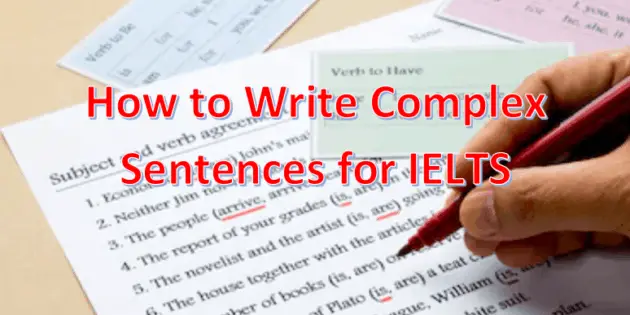In this post, I want to use my decades of IELTS teaching experience and examining to show you how to write complex sentence structures for IELTS writing tasks 1 and 2, and also for IELTS speaking.
If you want the short answer though, complex sentences can be made by simply linking together two or more chunks of information in one sentence. This if often done by using linking words and phrases, such as, ‘and’, ‘however’, ‘even though’, ‘although’ and ‘but’.
There are a lot of examples of different sentences structures I would like to teach you, so I have put this information together in a video. I also love to write so I have added an article underneath which summarises the information too.
My Full Course – Increase Your IELTS – Covers All The Grammar And Vocabulary You Need To Succeed!

Complex Sentences and IELTS Band Marking Criteria
Let’s start by taking a look at the band marking criteria for a band 7 and higher, you need to write using a variety of complex structures. For a band eight, you need to rise using a wide range of structures and for a band six, you need to write using a mix of simple and complex sentence forms. And for band five, you are attempting complex sentences, but these tend to be less accurate. You can read them in full here.
So, basically, if you can’t write complex sentences, you’re in a band five, you need to be using a mix of them in band six. But to get a band seven, you need to be able to make a variety of complex sentences and you need to be getting these correct most of the time that you’re writing them.
But don’t worry, this is really not as hard as it sounds. IELTS call them complex sentences or complex structures, but that doesn’t actually mean they complicated in any way, shape or form to write.
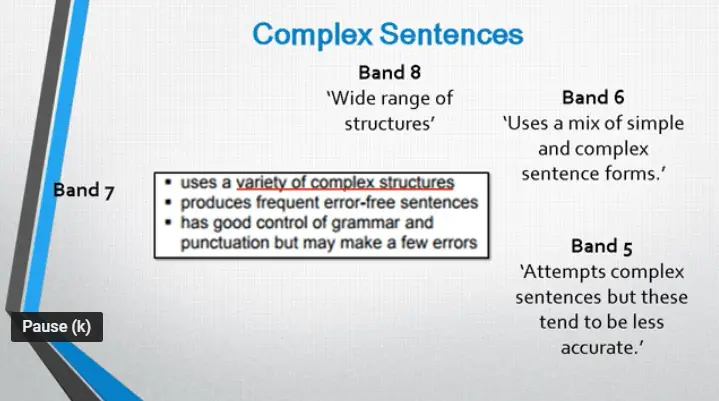
In fact, some of them can be really easy to write, and you’re probably writing them already yourself. So don’t worry, it’s not as hard as it sounds.
I’d also like to add that this one part of your essay can really help you transform the overall appearance and fluency of your essay. I remember one student, his name was called Dom from China, and he always wrote in quite simple sentences.
The other parts of his essay were good. He had good vocabulary. His writing was very coherent and well structured, and he always answered the question. But he always wrote in simple sentences.
However, after I showed him how to do this properly, sat him down and went through what I’m going to show you now, he got it. He understood how to write these sentences and make them complex. He realized it wasn’t as difficult as he thought and immediately his grammar score went up by a whole band and a half!
So, learning how to write complex sentences like this gave him confidence with his writing and it made him more enthusiastic about his work. So, he went away and studied even harder. And just a month later, he was able to get a band 7.5 five overall from being a band five just a couple of months ago.
These techniques that I’m about to show you really transformed his overall IELTS experience. So, think about that as you’re going through this.
My Full Course – Increase Your IELTS – Covers All The Grammar And Vocabulary You Need To Succeed!
#1 Use The Subordinate Clause Complex Sentence Structure
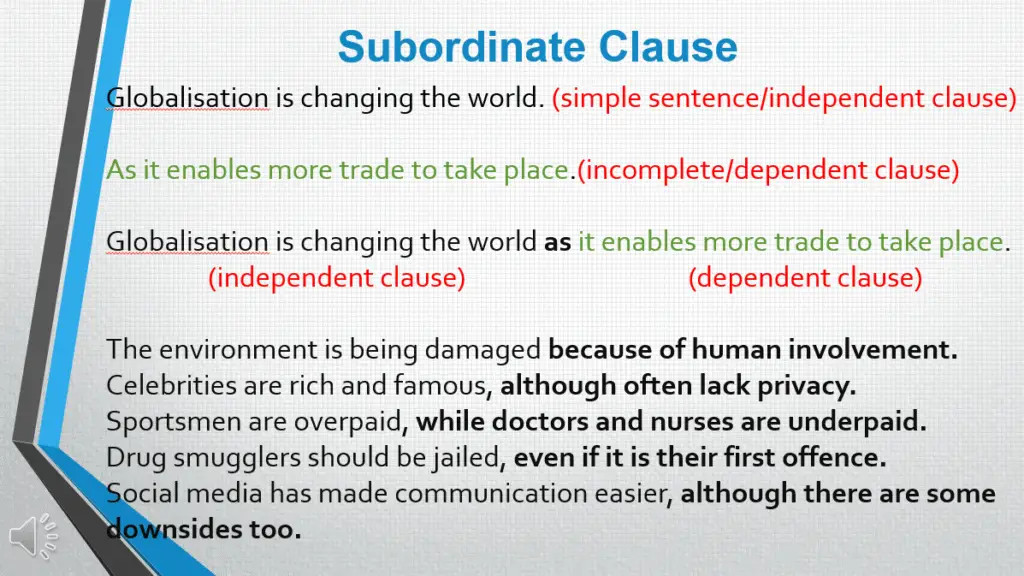
The first complex sentence we’re going to talk about is one using the subordinate clause. Have a look at this sentence, please.
Globalization is changing the world. (independent clause)
Now, that is a simple sentence. It’s got a subject ‘Globalization’ an object, which is the world and that makes perfect sense on its own and it doesn’t need anything else to be grammatically correct.
We call this an independent clause. It’s one piece of information that fully makes sense on its own. This next sentence says :
as it enables more trade to take place. (dependent clause)
It’s got a capital letter and a full stop, but as a sentence, it doesn’t make sense on its own. It’s not a complete thought. It doesn’t work. And because of this, because it needs something else, we’re going to call it a dependent clause, because it depends on something else.
What we need to do is put that dependent clause after an independent clause and create a sentence like this.
Globalization is changing the world as it enables more trade to take place.
So here we have the independent clause, which is one simple sentence at the beginning, and then we’ve added a dependent clause which provides us with more information after that. And we linked it with what we call a conjunction ‘as’.
This is now a complex sentence. Let’s have a look at some more examples of this.
The environment is being damaged because of human involvement.
You can see that ‘the environment is being damaged’ makes sense on its own. That’s the independent clause. The second half of the sentence ‘because of human involvement’ does not make sense on its own.
Therefore, it’s dependent on the independent clause. Another example,
Celebrities are rich and famous, although often lack privacy, sportsmen are overpaid while doctors and nurses are underpaid.
Drug smugglers should be jailed even it is, even if it is their first offense.
Social media has made communication easier, although there are some downsides to.
All of those have a dependent clause and an independent clause and the linked together with a subordinate conjunction, let’s have a look at some of those subordinate conjunctions now.
Here’s a table full of subordinate conjunctions, these are some of the most common ones that you will probably want to use in your essays. I’m sure you’ve seen some of these before. Like I said, complex sentences aren’t as difficult as they sound.
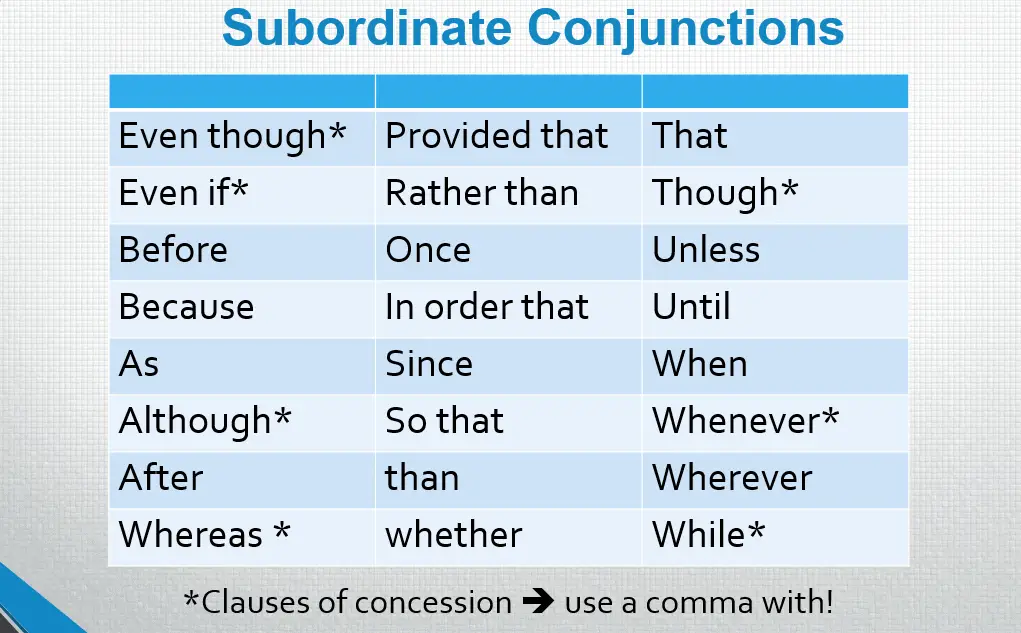
The star indicates that you’re going to use these in clauses of concession.
A clause of concession basically means that the second half of your sentence is going to contrast somehow with the first half. So you use words like this: though, even if, whereas and even though, to make a concession.
You can see that in the examples in the video the second half takes away somehow or goes against the original idea in some way.
Now, the reason I mention this is that when you use these subordinate conjunctions you need to use a comma.
If we have a quick look back at those examples, you can see we’ve used a comma with those subordinate conjunctions. It’s definitely worth remembering as you get marked for your punctuation as part of your grammar band score.
Here we can see exactly what I meant in the first sentence.
The environment is being damaged because of human involvement.
The dependent clause there ‘because of human involvement’, doesn’t need the comma with it because it’s not a subordinate conjunction of concession. It’s just adding more explanation to it.
My Full Course – Increase Your IELTS – Covers All The Grammar And Vocabulary You Need To Succeed!
The second sentence, celebrities are rich and famous, comma, although often lack privacy. So, being rich and famous, everyone thinks is really good, but in the second dependent clause, we’re saying, well, we’re giving a negative aspect of being rich and famous. So that’s a contrast.
That’s a concession so we need a comma.
What else can we do with the subordinate clause? Well, IELTS band marking criteria, says that we have to show good control of grammar. One way to demonstrate that is to not always put the dependent clause after the independent clause.
You can actually start with the dependent clause or the subordinate clause, and that shows that you can do both ways to the examiner. So let’s see an example.
Celebrities are rich and famous, although they often lack privacy. That’s the original sentence we can change that to. Although they often like privacy, celebrities are rich and famous.
Similarly, sportsmen are overpaid while doctors and nurses are underpaid, while doctors and nurses are underpaid, sportsmen are overpaid, and so on.
#2 The Relative Clause Complex Sentence Structure
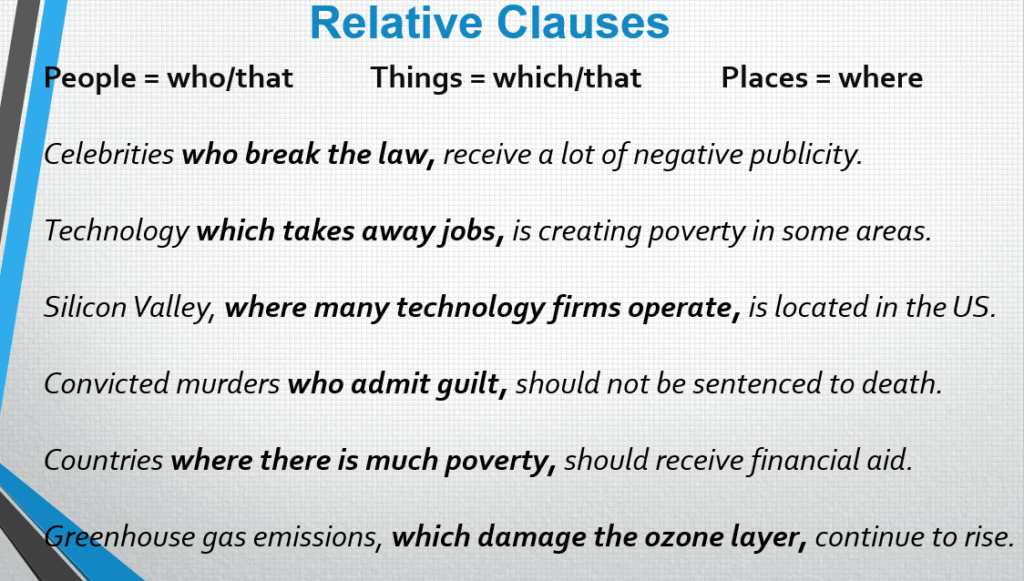
Let’s take a look at the next method. The next method is to use relative clauses. Now, these are used to give extra information about a person, place or thing, and they are useful for reducing the overall number of words in your essay.
And so this actually improves the fluency and readability of your essays. For example, the destruction of the environment is continuing at a faster pace. Most people are against this. That’s two simple sentences. Nothing wrong with them, but it sounds nicer and it’s a high level of grammar. If you write ‘the destruction of the environment, which most people are against, is continuing at a fast pace‘.
After the first noun (the thing you’re talking about) is the place where you add in the relative clause. And here we’re talking about a thing which is the destruction of the environment. So because this is a thing we’re going to use the word ‘which’, if we were talking about a person we would use ‘who’ or ‘that’ or for a place we could use ‘where’.
Let’s have a look at a few more examples:
Firstly, the relative clause ‘who break the law’ is added after the main noun of the sentence. And also, the sentence, even without the relative clause, makes sense on its own.
Celebrities receive a lot of negative publicity.
That’s because that it has a subject ‘Celebrity’, a verb ‘receive’ and an object, which is the completion of the clause ‘negative publicity’.
Another example,
technology which takes away jobs is creating poverty in some areas.
Again, we’ve got the relative clause straight after the noun and also without it, the sentence makes sense on its own and the verb is in the correct form as well.
Next one, Silicon Valley, where many technology firms operate, is located in the US again after the main noun. The sentence works even without the relative clause and the subject verb agreement is correct as well.
You should be getting the idea of this now. So after the main verb, after the main noun of the sentence. We’ve inserted the relative clause and it still makes sense without the relative clause and countries.
So, here are a few things to remember about relative clauses.
Firstly, the clause comes after the noun.
Secondly, there must still be an independent clause that works on its own. That means it must have a subject, verb and an object. We simply insert the relative clause after the main noun.
Thirdly, the verbs must agree, as in singular or plural. And you might also have noticed that there were commas. Sometimes we had commas after the main noun and sometimes we didn’t.
Now the reason for this is that if the information contained in the relative clause is extra information, meaning we don’t really need it to understand the overall sentence, then we use commas. If the information, on the other hand, is essential, we don’t use commas.
So in the example here,
Celebrities who break the law receive a lot of negative publicity.
There is no comma after celebrities because it’s really important that the reader knows that it’s only the celebrities who break the law that get the negative publicity. It’s not all celebrities that get negative publicity, just the ones that break the law. So that relative clause is essential for the reader to read. Therefore, there is no comma.
However, in the next sentence, we’ve got
Silicon Valley, where many technology firms operate, is located in the US here.
It’s not essential for the overall meaning of the sentence for the reader to read that relative clause, ‘Silicon Valley is located in the US’. Fine, we don’t need to know that that that’s where many technology firms operate. That’s just extra information that’s non-essential.
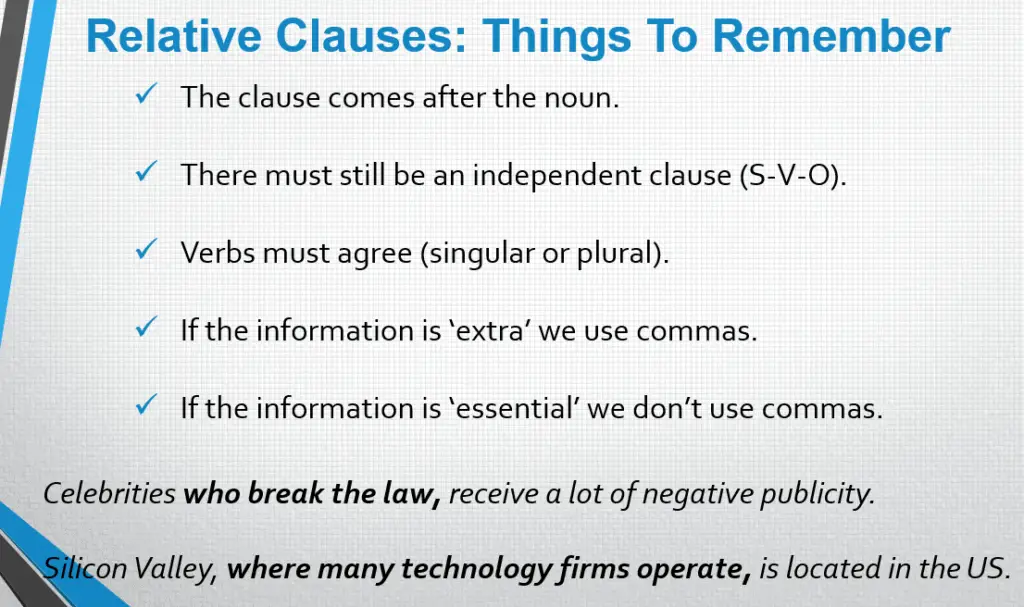
#3 The Compound Sentence Structure
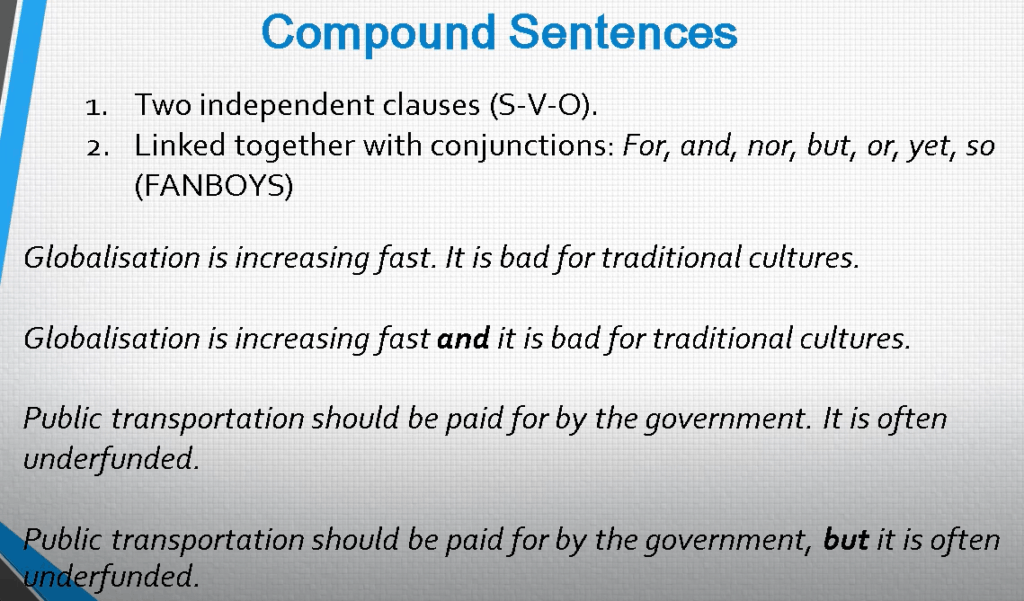
Now we’re going to look at another way to make complex sentences, which is much easier, and you probably do this yourself already. In fact, I’m sure you do. So let’s take a look.
This is called compound sentences. And basically we need two independent clauses and we link them together with conjunctions like for, and, nor, but, or, yet, sometimes these are referred to as fanboys.
Now, let’s look at an example.
Globalization is increasing fast. It is bad for traditional cultures.
Two perfectly good, simple sentences with correct grammar. They are not complex sentences. However, if we simply link them together, globalization is increasing fast and it is bad for traditional cultures, then we now have a compound sentence. It is as easy as that, and that is considered to be a complex sentence.
Some people believe or think or some students think that it’s not difficult enough to be a complex sentence, but it most definitely is, and the IELTS examiners consider it to be so as well.
It’s definitely worth using these compound sentences. Let’s have another look at a different example.
Public transportation should be paid for by the government. It is often underfunded.
Public transportation should be paid for by the government, but it is often underfunded.
There we go. That’s a complex sentence that would fit very nicely into an essay. So that’s another way to make complex sentences. All right, this is the exciting part where we can fit these different complex sentences together.
If YOU Need More Help Then Take A Look At My Full Course Here!
#4 Combining Complex Sentence Strucutres
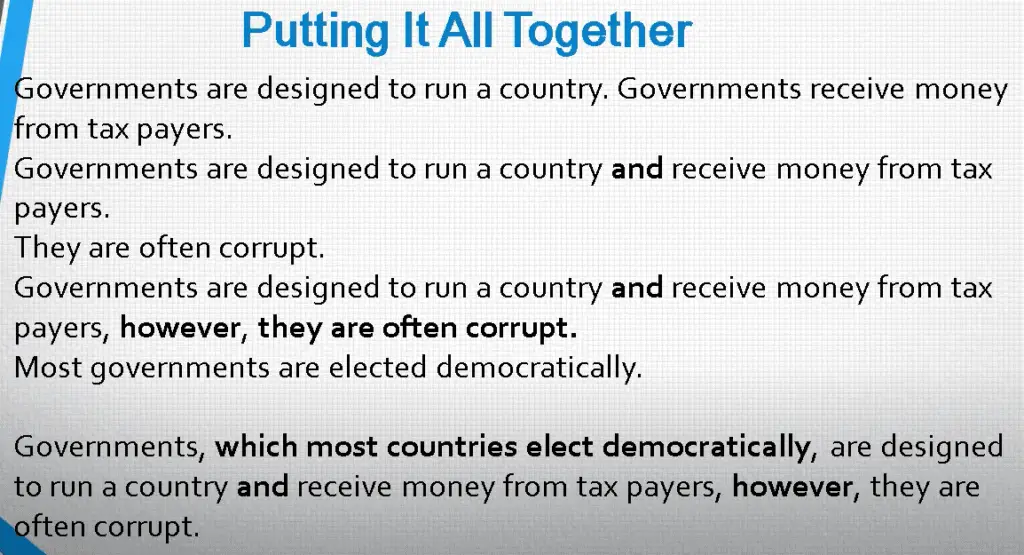
Now, it’s perfectly fine if you want to use those complex sentences exactly as I’ve just shown you. That’s really that’s fine. However, you can attempt to combine one or two of them and make ones that are even more complex.
These are the sorts of sentences that are going to get you eight and nines if you can use them accurately and consistently through your essays. But the good news is they all do start simply. You just build them up.
Let’s see how it’s done. So we’ve got two simple sentences here.
Governments are designed to run a country.
Governments receive money from taxpayers.
OK, we can make a compound sentence with those ‘Governments are designed to run a country and receive money from taxpayers’.
And we gradually add in more pieces of information using the techniques we have covered in this article.
So finally, ‘Governments, which most countries elected democratically, are designed to run a country and receive money from taxpayers, however, they are often corrupt.‘
Now, I’m sure you can see the complexity of that sentence that would fit really nicely into any essay.
But there does come a point where the sentences are starting to get too long and there’s too many clauses to it, and that will not school you a high band score because they do not sound native like.
By adding too many clauses, it becomes difficult, a bit strange to read. It’s not how we naturally write. So two or three clauses is quite natural. I wouldn’t go much beyond that.
OK, a few final words of advice then. Now, I’ve shown you those different ways to make complex sentences, go have a look at some of your past essays and see how well you’re actually doing this. You might surprise yourself that you’re using some quite complex sentences already.
If you’re not, well, have a look to see where you could have used them in your past essays and use your past essays as practice. So take two simple sentences from there and see if you can make them into a compound sentence or can you make one into a relative clause for the other or subordinating clause for the other?
It is particularly important that you do get these checked by a teacher or a native speaker.
Where can you use these complex sentences in your essay?
Well, complex sentences basically could fit anywhere in your essay. They’re particularly good for topic sentences or as supporting sentences. They provide a great opportunity for you to be able to show off your range of grammatical structures.
I will say that you should go with the 100 percent rule in the exam. The one hundred percent rule is that if you’re not sure about it, then don’t write it.
In the exam, don’t suddenly start trying to write complex sentences like the very last one I showed you. You need to build up to that in your practice. And when you’re 100 percent sure about building sentences like that, then go ahead and use them in the exam!
If you can master the relative clause and the subordinate clause, just those two on their own, you can probably do the compound sentences already. So, that’s three you’ve got.
If you can master those, you’ll do really well. Well done for getting through this video/article. I know It’s been a long one, but it’s going to be well worth it for you when you see the impact it has on your band score.
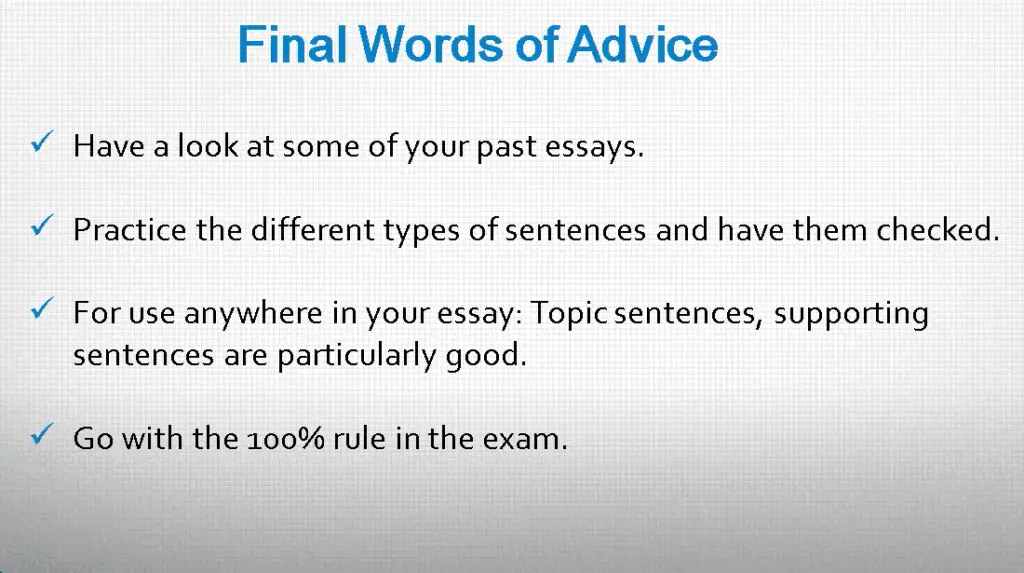
If YOU Need More Help Then Take A Look At My Full Course Here!
Recommended IELTS Study Tools
Thank you for reading this article. I always get lots of questions about how else to get a better band score quickly. So, this is what I recommend:
Complete IELTS Course: Of course, my full course ‘INCREASE YOUR IELTS‘ covers everything you need to need to know to pass IELTS, including practice questions, model answers, grammar work, strategies for every possible reading, writing and listening question type, as well as a complete speaking course too, check it out here.
IELTS Essay and Speaking Feedback: To complete full mock tests and get feedback from IELTS examiners on your IELTS essays or speaking tasks then visit: IELTS Feedback and Mock Tests, here.
Improve your grammar fast by using the Grammarly suggestions to improve your writing. Every IELTS students should have this free grammar improving tool.
Improve all-round English skill with EnglishClass101.com. If you have failed IELTS more than once then you probably need to improve your general level of English. Use the free online lessons and vocabulary building tools here and start improving today! HIGHLY RECOMMENDED!


